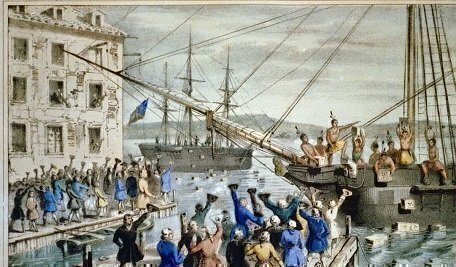On December 16, 1773, a group of Colonists destroyed a large British tea shipment in Boston harbor. So did this act of defiance light a fire that led to American independence within the next decade?

For years, Americans refused to buy British tea because it included a tax levied on tea drinkers, a thought that repulsed colonists who didn’t believe they should be taxed without a representative sitting in the British parliament to voice their concerns.
Instead, Americans bought tea smuggled into the colonies. But in May 1773, Parliament gave the East India Company a tea monopoly in America that also made British tea much cheaper than smuggled tea.
The animosity had been brewing among the American colonists for months. On October 16, 1773, a group of Philadelphia patriots decided to tell the British Crown that it would mount a boycott of tea, months before a similar act in Boston.
The publication of a document from the meeting called Philadelphia Resolutions triggered public protests in Boston and Philadelphia. “The claim of parliament to tax America, is, in other words, a claim of right to levy contributions on us at pleasure,” the Resolutions said. “The duty, imposed by parliament upon tea landed in America, is a tax on the Americans, or levying contributions on them, without their consent.”
The Resolutions also made it clear that the group thought the money raised by the tea tax through the Townshend Acts would be used by the Crown to eliminate local governments run by the colonies, and the group called on Americans to prevent “a violent attack upon the liberties of America” by stopping the unloading of tea shipments and any tea sales.
Three weeks later, a similar group met at Faneuil Hall in Boston, and it adopted the Philadelphia Resolutions.
“That the sense of this town cannot be better expressed than in the words of certain judicious resolves, lately entered into by our worthy brethren, the citizens of Philadelphia,” the Boston group said.
Two months later in Boston, three ships arrived with 342 chests of tea. In what became known as the Boston Tea Party, a party of men dressed as Native Americans dumped the tea chest’s contents into Boston Harbor, after the governor, Thomas Hutchinson, refused colonists’ demands for the ships to depart peacefully with their cargo unloaded.
In late December 1773, one ship with 698 cases of tea attempted to land in Philadelphia but it was turned away. A group of 6,000 Philadelphians met at the State House to discuss the situation, in what was the largest mass gathering in the colonies. Tea shipments were also blocked in New York and Charleston.
The violent protests in Boston Harbor were met with a direct response from Great Britain. In April 1774, the British Parliament passed the Coercive (or Intolerable) Acts, which punished Massachusetts for the Tea Party incident. The Acts not only took away home rule from Massachusetts, it forced all Americans to board British troops in unoccupied buildings.
At the same time, Franklin wrote a public letter in London, under an assumed name, that made it clear how he felt about Parliament, “who appear to be no better acquainted with their History or Constitution than they are with the Inhabitants of the Moon.”
“The Flame of Liberty in North America shall not be extinguished. Cruelty and Oppression and Revenge shall only serve as Oil to increase the Fire,” Franklin added.
The other colonies saw the Acts as a punishment targeted at all of them, and by September 1774, the First Continental Congress met in Philadelphia to determine an appropriate response. The following April, fighting broke out at Lexington and Concord, and the American Revolution was underway.







